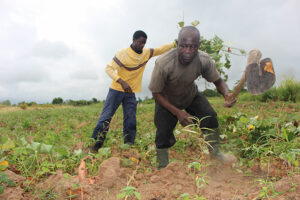More than 5,000 farmers in Ghana benefit from G-DGM climate change project
 A total of 5,411 farmers in three regions have benefited from capacity building training and investments opportunities under the Ghana Dedicated Grant Mechanism (G-DGM) Climate Change Project.
A total of 5,411 farmers in three regions have benefited from capacity building training and investments opportunities under the Ghana Dedicated Grant Mechanism (G-DGM) Climate Change Project.
The beneficiaries of the five year project which ended in April 29, this year were spread across 53 Districts and Municipalities in the Western North, Bono and Bono East regions.
Mr Seth Kankam Nuamah, the Coordinator of the Reclaim Sustainability Programme, Solidaridad West Africa, said the project started in April 2018, indicating that it covered 23 communities in Western North, 18 communities in Bono East and 12 communities in the Bono Regions.
He was speaking at a two-day international conference on Nature-Based Solutions (NBS) in Sunyani on the theme: “Nature-based Solutions for Climate Resilient Food Systems: Getting Prepared for a Climate-resilient Future”.
The University of Energy and Natural Resources (URNR) in collaboration with the Wageningen University and Research in the Royal Netherlands organised the conference to equip participants on the use of available natural resources in restoring degraded landscapes.
It further created opportunities for stakeholders in the food production chain to explore solutions for sustained food production as well as harnessing the potential of maximizing crop yields in the country.
Mr Nuamah explained the project raised and distributed 658,038 seedlings comprising 278,190 cashew, 219,000 acacia and 160,848 other economic trees.
In addition, 170,350 economic tree seedlings were supplied to beneficiary farmers of the Ghana Forest Investment Programme (G-FIP), an initiative of the Ministry of Lands and Natural Resources and the Forestry Commission.
He said the G-DGM project achieved about 91 per cent success rate, saying about 74 per cent of the seedlings planted survived, explaining that the G-DGM sought to promote the inclusion of forest-rich communities in efforts towards reducing emissions from deforestation and forest degradation.
This is geared towards sustainable forest management, conservation and enhancement of forest carbon stocks (REDD+).
Mr Nuamah explained the capacity building targeted local communities for them to acquire knowledge and practices to strengthen the REDD+ processes and the G-FIP.
It was also designed to promote and ensure sustainable forest management, saying the local communities would then use the knowledge to reduce greenhouse gas emissions.
Source: GNA
